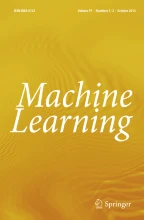Abstract
We consider the problem of using queries to learn an unknown concept. Several types of queries are described and studied: membership, equivalence, subset, superset, disjointness, and exhaustiveness queries. Examples are given of efficient learning methods using various subsets of these queries for formal domains, including the regular languages, restricted classes of context-free languages, the pattern languages, and restricted types of propositional formulas. Some general lower bound techniques are given. Equivalence queries are compared with Valiant's criterion of probably approximately correct identification under random sampling.
Article PDF
Similar content being viewed by others
Explore related subjects
Discover the latest articles and news from researchers in related subjects, suggested using machine learning.Avoid common mistakes on your manuscript.
References
Angluin, D. (1980). Finding patterns common to a set of strings. Journal of Computer and System Sciences, 21, 46–62.
Angluin, D. (1986). Types of queries for concept learning (Technical Report YALEU/DCS/RR-479). New Haven, CT: Yale University, Department of Computer Science.
Angluin, D. (1987a). Learning k-bounded context-free grammars (Technical Report YALEU/DCS/RR-557). New Haven. CT: Yale University, Department of Computer Science.
Angluin, D. (1987b). Learning k-term DNF formulas using queries and counterexamples (Technical Report YALEU/DCS/RR-559). New Haven, CT: Yale University, Department of Computer Science.
Angluin, D. (1987c). Learning propositional Horn sentences with hints (Technical Report YALEU/DCS/RR-590). New Haven, CT: Yale University, Department of Computer Science.
Angluin, D. (1987d). Learning regular sets from queries and counterexamples. Information and Computation, 75, 87–106.
Angluin, D., & Laird, P. (1987). Learning from noisy examples. Machine Learning, 2, 343–370.
Angluin, D., & Smith, C. (1983). Inductive inference: Theory and methods. Computing Surveys 15, 237–269.
Barzdin, J. M., & Freivald, R. V. (1972). On the prediction of general recursive functions. Soviet Mathematics Doklady, 13, 1224–1228.
Berman, P., & Roos, R. (1987). Learning one-counter languages in polynomial time. Proceedings of the Twenty-Eighth IEEE Symposium on Foundations of Computer Science (pp. 61–67). New York: The Institute of Electrical and Electronics Engineers.
Blumer, A., Ehrenfeucht, A., Haussler, D., & Warmuth, M. (1986). Classifying learnable geometric concepts with the Vapnik-Chervonenkis dimension. Proceedings of the Eighteenth Annual ACM Symposium on Theory of Computing (pp. 273–282). Berkeley, CA: The Association for Computing Machinery.
Blumer, A., Ehrenfeucht, A., Haussler, D., & Warmuth, M. (1987). Learnability and the Vapnik-Chervonenkis dimension (Technical Report UCSC-CRL-87–20). Santa Cruz: University of California, Computer Research Laboratory.
Haussler, D. (1986). Quantifying the inductive bias in concept learning. Proceedings of the Fifth National Conference on Artificial Intelligence (pp. 485–489). Philadelphia, PA: Morgan Kaufmann.
Haussler, D. (in press). Quantifying the inductive bias: AI learning algorithms and Valiant's framework. Artificial Intelligence.
Kearns, M., & Li, M. (1987). Learning in the presence of malicious errors (Technical Report TR-03–87). Cambridge, MA: Harvard University, Center for Research in Computing Technology.
Kearns, M., Li, M., Pitt, L., & Valiant, L. (1987). On the learnability of Boolean formulae. Proceedings of the Nineteenth Annual ACM Symposium on Theory of Computing (pp. 285–295). New York: The Association for Computing Machinery.
Knobe, B., & Knobe, K. (1976). A method for inferring context-free grammars. Information and Control, 31, 129–146.
Laird, P. (1987). Learning from good data and bad. Doctoral dissertation, Department of Computer Science, Yale University, New Haven, CT.
Levy, L., & Joshi, A. (1978). Skeletal structural descriptions. Information and control, 39, 192–211.
Littlestone, N. (1987). Learning quickly when irrelevant attributes abound: A new linear-threshold algorithm. Machine Learning, 2, 285–318.
Pitt, L., & Valiant, L. (1986). Computational limitations on learning from examples (Technical Report TR-05–86). Cambridge, MA: Harvard University, Center for Research in Computing Technology.
Sakakibara, Y. (1987a). Inductive inference of logic programs based on algebraic semantics (Technical Report No. 79). Numazu, Japan: Fujitsu Limited, International Institute for Advanced Study of Social Information Science.
Sakakibara, Y. (1987b). Inferring parsers of context-free languages from structural examples. (Technical Report No. 81). Numazu, Japan: Fujitsu Limited, International Institute for Advanced Study of Social Information Science.
Sammut, C. & Banerji, R. (1986). Learning concepts by asking questions. In R. S., Michalski, J. G., Carbonell, & T. M., Mitchell (Eds.), Machine learning: An artificial intelligence approach (Vol. 2). Los Altos, CA: Morgan Kaufmann.
Shapiro, E. (1981). A general incremental algorithm that infers theories from facts. Proceedings of the Seventh International Joint Conference on Artificial Intelligence (pp. 446–451). Vancouver, B.C., Canada: Morgan Kaufman.
Shapiro, E. (1982). Algorithmic program diagnosis. Proceedings of the Ninth ACM Symposium on Principles of Programming Languages (pp. 299–308). Albuquerque, NM: The Association for Computing Machinery.
Shapiro, E. (1983). Algorithmic program debugging. Cambridge, MA: MIT Press.
Valiant, L. G. (1984). A theory of the learnable. Communications of the ACM, 27, 1134–1142.
Valiant, L. G. (1985). Learning disjunctions of conjunctions. Proceedings of the Ninth International Joint Conference on Artificial Intelligence (pp. 560–566). Los Angeles, CA: Morgan Kaufmann.
Author information
Authors and Affiliations
Rights and permissions
About this article
Cite this article
Angluin, D. Queries and concept learning. Mach Learn 2, 319–342 (1988). https://doi.org/10.1007/BF00116828
Received:
Revised:
Issue Date:
DOI: https://doi.org/10.1007/BF00116828
